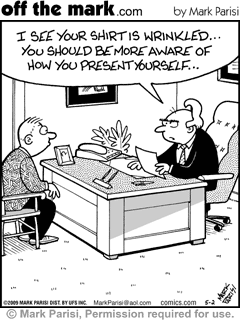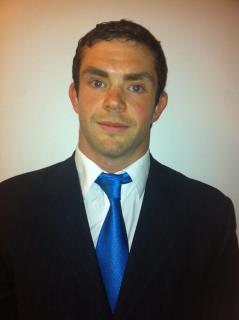Interview Preparation
What to Wear to a Job Interview[edit | edit source]
Now I don’t want to be insulting anyone, but in general, physiotherapy students the world over are renowned for their casual attire. Turning up to face the hard day of college in their best tracksuit – or even shorts... You just never know when you will be asked to volunteer your leg or other body part or have to demonstrate a technique on someone else. However, when we enter the professional world, our attitudes towards our dress have to change too. Here are a few tips on how you should present yourself when you get that all-important for an interview.
The key objective as regards:correct interview dress is to ensure you appear confident, competent and professional. Having said this, your clothes should not in any way make a statement by themselves or deflect attention from what you have to say during the interview.
Studies show that we humans rightly or wrongly make our minds up about someone within roughly few seconds of meeting them. What you wear, your body language and how you communicate all tell a story to the interviewer as to whether or not you are the type of person likely to fit in with their team, the company culture as well as the clients they do business with.
"A series of experiments by Princeton psychologists Janine Willis and Alexander Todorov reveal that all it takes is a tenth of a second to form an impression of a stranger from their face, and that longer exposures don’t significantly alter those impressions (although they might boost your confidence in your judgments). Their research is presented in their article “First Impressions,” in the July issue of Psychological Science.
Willis and Todorov conducted separate experiments to study judgments from facial appearance, each focusing on a different trait: attractiveness, likeability, competence, trustworthiness, and aggressiveness.
Participants’ judgments were compared with ratings of the same photographs given by another group of participants in a preliminary study, in which there were no time constraints for judging the personality traits of the faces. (In that preliminary study, there was strong agreement among the various participants about the traits of the people in the photographs.)".[1]
The key message is dress to impress: it's cheesy but true. If you stroll into the interview wearing nothing but a tracksuit and a smile, the only door you'll find open to you is the one that leads out of the building, no matter how shiny the suit, how dazzling the smile.
Ladies[edit | edit source]
Dark-coloured, well-fitting suit – either trousers or skirt (knee length or below).
Socks: dark coloured if wearing trousers, skin colour tights if wearing a skirt.
Light (pastel or white) coloured open-neck blouse. Not too low cut or too tight.
Shoes: Closed-toe, leather, low heel. Make sure you can walk in them. Ensure no scuff marks.
Nails: manicured and clean. Paint in natural colour.
Natural make-up.
Minimal jewellery and perfume.
Gentlemen[edit | edit source]
Dark coloured, well fitting plain / pinstripe suit.
Shirt: light coloured (e.g. white, light blue) with long sleeves.
Tie: bold colour, plain or with discrete patterns. Avoid large, random patterns or quirky designs.
Socks: Dark without quirky patterns
Shoes: clean, polished black shoes.
Facial hair: cleanly shaven or neatly trimmed if you insist on beard / moustache.
Nails: short and clean.
Aftershave: minimal (not over-powering)
What Not to Wear on a Job Interview[edit | edit source]
- Flip-flops or sneakers.
- Underwear that is visible.
- Shorts.
- Jeans.
- Skirts/ dresses that are too short.
- Trousers that are too low-rise or too tight.
- Blouses that are too low-cut or too short - don't show your cleavage or your belly.
- All interview outfits should be clean, free of wrinkles or creases, dog hairs, deodorant marks, fraying hems or straining zips and buttons. They should not be ill-fitting i.e not too short / long/ tight / baggy.
What you may bring to an Interview[edit | edit source]
A smart organised briefcase, handbag or folder containing:
- Extra copies of your curriculum vitae on high-quality paper.
- Photocopies of your letters of reference previous employers and character witnesses.
- The notes you took during your pre-interview research.
- Any relevant certification e.g. CPD, First Aid etc.
- Chewing gum or breath mints (to be used prior to the interview, not during it).
- Pens.
- Pocket packet of tissues.
- Spare pair of tights
- Ensure your mobile is on silent.
How to Combat Interview Nerves[edit | edit source]
If the very thought of sitting in front of an interview panel is giving you the heebeejeebies – don’t worry. You are not the only one to get nervous – it happens to everyone, it’s just a matter of knowing how to cope with it and prevent it from affecting your interview performance.
Be (Over)Prepared[edit | edit source]
Be comfortable with the content of your CV, as well as the job, industry and the specific site you wish to work. You should know your employment history and CV like the back of your hand. You are the world expert on what you have accomplished and achieved. Prepare what interview questions you may be asked, especially competency based ones. Prepare in front of a mirror, or if possible, hold mock interviews with friends or family. Better still, record this so you can clearly pick out if there is anything specific you do when you are nervous, e.g.overusing a word or phrase, twirling your hair, fidgeting with your jewellery, violently tapping your leg etc. If you are aware of your personal reaction to stress it will make it much easier to deal with. Remember it's acceptable to be stressed, just try to hide it as much as possible from your prospective employer.
Get There Early - but Not Too Early[edit | edit source]
Rushing, getting lost, and the fear of being late all provoke anxiety. Print out directions to the interview location the night before (get an alternative route as well) and plan to arrive 30 minutes early. But do not enter the building until 10 minutes before the interview. The anticipation of waiting can be brutal. Have a mini-plan to kill some time before the interview – get some fresh air or do some deep breathing. One of the worst things you can do is get to an interview too early and be stuck waiting in the reception area for too long. If a secretary /receptionist is present, introduce yourself.
Common questions[edit | edit source]
Here are the most common interview questions :
- Tell me about yourself
" The key to answering this question is acknowledging that everyone has flaws. Hiring managers ask about your greatest weakness to evaluate your self-awareness. Can you assess your current talents and identify areas for improvement?
Giving an authentic answer lets them know you’re able to be honest with yourself and others about how you can grow both as a person and a colleague. It shows your drive to reach professional goals, as well as the likelihood that you will become a valuable team member who takes initiative and solves problems.
Keep in mind that hiring managers are looking for two main insights: your weakness and the steps you’re taking to improve. You shouldn’t list one of those without the other. As you answer, provide a specific example of how you are improving. " [4]4. Why did you leave your last job?" When employers ask why you left your last job—specifically, if you left voluntarily—they are looking for insight into your job performance and your professional ethics. They want to know that you can perform the expected job functions, successfully meet professional expectations and manage relationships with colleagues.
They also want to know about your loyalty and commitment to the organization. Knowing the circumstances under which you left your former position is connected to that. For example, leaving abruptly with minimal notice is very different from giving a three-month notice about your decision to pursue an advanced degree." [5]
In the Interview[edit | edit source]
- Greet the interviewing panel with a firm handshake (with eye contact) and a smile.
- Keep your posture straight, with your legs crossed at the ankles or feet flat on the floor. This ensures you come across relaxed and composed. Don't hunch in your chair or fold your arms, this may come across as nervousness, disinterest or that you are hiding something. Make frequent eye contact with all of the panel, focusing more attention to the person who asked you the question. However, don't stare continually at someone - this may creep them out just a little!!
- Breathe deeply and regularly throughout the interview (think ACBT - maybe just the relaxed breathing stage, the forced expiratory cough mightn't go down so well!!)
- Listen carefully to the questions, if you are confused, asked the interviewer to restate it.
- Give a slight pause before answering the questions, this gives you a chance to breathe and organise your thoughts.
- Try to be informal but professional when responding. Speak in a conversational manner, but respond professionally. Focus on speaking slowly and calmly.
- Don't dwell on your mistakes. Remind yourself that everyone makes mistakes. If you feel yourself starting to painc, take a deep breath, regain composure, refocus and move on to the next question.
- Your body language often says more than your words - you want to come across as open, friendly and professional in your appearance, actions and worde
- If offered an opportunity, ask questions that are related to the performance and practice of the company rather than questions that refer to personal gains.[6]
You can find more informations here.
- ↑ How many seconds to a first impression? -Eric Wargo , Association for Psychological Science, July 1 2006
- ↑ [1]Common interview questions and answers - Indeed Editorial Team , Updated 15 March 2023, link accessed on 30th June 2023
- ↑ How To Answer "Where Do You See Yourself in 5 Years?" - Hanne Keiling, Updated June 9, 2023, Accessed on June 30 2023
- ↑ Interview Question: What Are Your Greatest Weaknesses? , Indeed Editorial Team, Updated March 11, 2023, Accessed link June 30, 2023
- ↑ How To Answer Why You Left Your Last Job- Jamie Birt, Updated June 9, 2023, Accessed link June 30,2023
- ↑ Job Interview Guides









